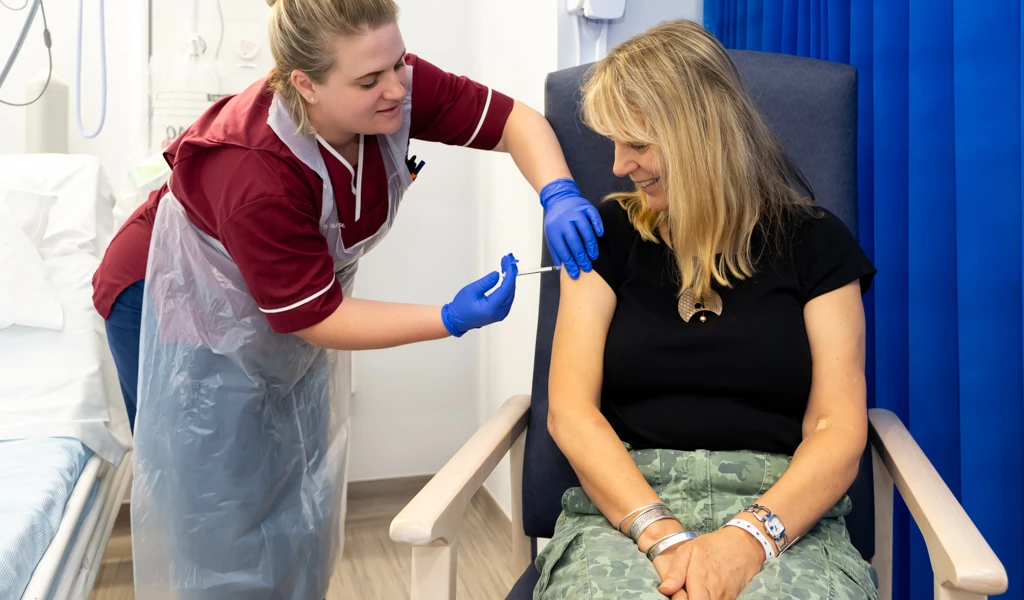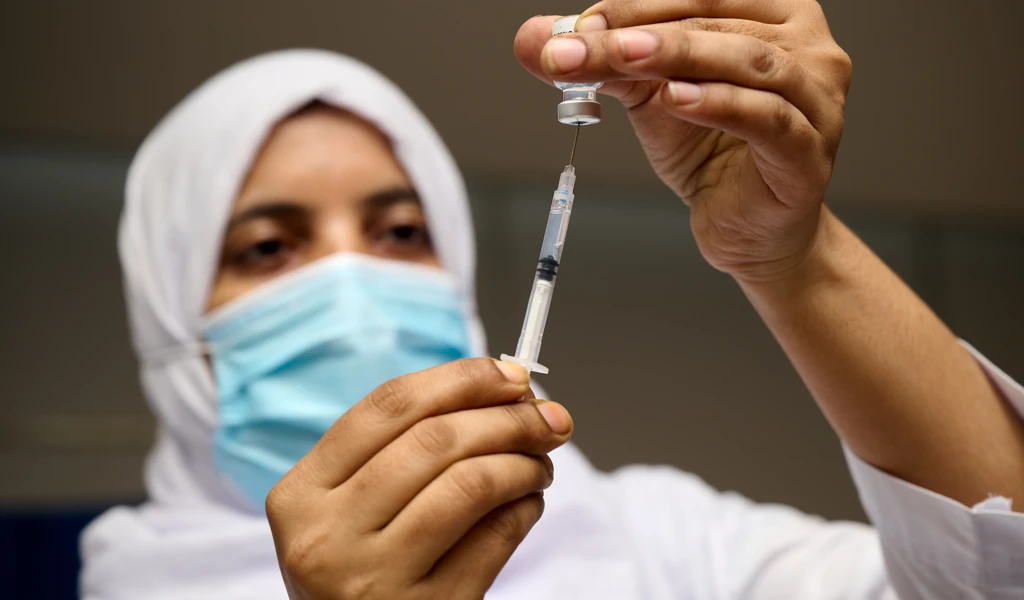CEPI supports novel mRNA vaccine development in Korea to protect against future Disease X

Novel self-amplifying design has the potential to reduce dosage and cost of vaccines, supporting rapid global rollout in response to an emerging infectious disease outbreak.
12 December 2023, OSLO, Norway and SEOUL, South Korea — The Coalition for Epidemic Preparedness Innovations, CEPI, has partnered with Korea's Chungbuk National University (CBNU) to advance development of CBNU's self-amplifying mRNA vaccine technology. The partnership aims to better prepare the world for future epidemic and pandemic threats, including an unknown or as-of-yet unidentified pathogen, known as Disease X, in pursuit of the 100 Days Mission.
Advances in mRNA vaccines have been critical to the global response to COVID-19 and the technology has been identified as a pivotal enabler of rapid outbreak management. As part of its plan to expand use of and access to novel mRNA innovations which can further bolster global pandemic preparedness, CEPI will provide CBNU with up to US $1 million in seed funding to support evaluation of the immune response and efficacy of their mRNA vaccine technology in preclinical models.
With CEPI's support, CBNU will first assess the platform against avian influenza H5N1 virus. The findings will provide a model to help assess this new technology and explore how it could be used to rapidly respond to a future Disease X in as little as 100 days. The 100 Days Mission is an ambitious goal spearheaded by CEPI, and embraced by the Republic of Korea as part of its strategic plan against emerging infectious diseases, that aims to accelerate vaccine development to around 100 days from virus identification, potentially stopping a future outbreak in its tracks before it becomes a pandemic.
In addition to accelerating future outbreak response, CBNU's innovative technology could also enhance accessibility to mRNA vaccines. The self-amplifying design works by giving the body instructions to replicate mRNA which could amplify the amount of protein made and reduce the amount of antigen, necessitating fewer vaccine doses and reducing the cost of the vaccine. Costs could be further reduced due to the distinctive CBNU vaccine design which proposes replacing the 5'cap — a typical feature in mRNA — with an alternative modification.
Dr Richard Hatchett, CEO of CEPI, said: "While mRNA technology transformed our response to the COVID-19 pandemic, we must now invest in promising novel innovations that capitalise on mRNA's transformative qualities to provide more effective responses to future epidemics and pandemics. This new partnership further fortifies our collaborations with Korea's world-leading vaccine sector, with Chungbuk National University's mRNA technology offering advantages against existing mRNA platforms which could improve access to such vaccines in the future."
ChangSeop Koh, President of Chungbuk National University, said: "We are extremely proud and excited to collaborate with CEPI on this groundbreaking project. This partnership highlights the innovative capacity of Chungbuk National University's research and places us at the forefront of global efforts to respond to future pandemics. Our self-amplifying mRNA technology provides higher efficiency without the need for costly manufacturing materials used in conventional mRNA vaccines. This technology promises to bring significant changes in vaccine development, offering faster, cost-effective, and adaptable solutions to new health threats. Our collaboration with CEPI demonstrates our commitment to advancing global public health and ensuring equitable access to life-saving vaccines. We are dedicated to using our expertise and resources to make a significant impact in the global fight against infectious diseases."
CEPI's investment in CBNU's novel mRNA innovation is the latest partnership to be established as part of its programme to advance novel RNA vaccine platform technologies for emerging and select endemic infectious diseases. The programme seeks to evaluate whether the next-generation of RNA technologies, such as self-amplifying platforms, could offer substantial advantages over existing platforms, for example improved immunogenicity, storage, stability, productivity, response time, and cost-of-goods.
Novel mRNA technologies such as the one being developed by CBNU could make a vital contribution to the proposed Global Vaccine Library. Central to the 100 Days Mission, a Global Vaccine Library is envisaged as a global repository of vaccine resources, capabilities, and data which could be pulled ‘off the shelf' and quickly adapted in response to a future outbreak, accelerating the development of life-saving vaccines.
CEPI and CBNU are committed to enabling equitable access to the outputs of this CEPI-supported programme, in line with CEPI's Equitable Access Policy. This ultimately includes commitment to vaccines being available first to populations at risk when and where they are needed at an affordable price should a related vaccine be developed further using CEPI funding. Project results including data generated as part of this project will be published open access for the benefit of the global scientific community.
Korea: A driving force in global vaccine development
The new partnership with CBNU extends CEPI's breadth of work with academic, government and pharmaceutical sector institutions in Korea, with CEPI having committed up to USD 292 million to partnerships in Korea to date. The Republic of Korea and CEPI representatives recently attended a signing ceremony to formalise Korea's increased USD 24 million investment in CEPI for 2023. CEPI also co-hosted a plenary session with IVI and the Korean Ministry of Health and Welfare last month at the World Bio Summit held in the Republic of Korea titled ‘Strengthening Global Preparedness through CEPI's 100-Days Mission'.
ENDS
Notes to Editors
mRNA vaccine technology
mRNA vaccines use the body's own machinery to make antigenic protein rather than injecting the pure antigen directly into the body (an antigen is a foreign substance that induces an immune response).
mRNA technology has been identified as a pivotal enabler of the 100 Days Mission due to its flexibility as a rapid-response platform on which new vaccine candidates can be designed and quickly made ready for clinical testing and subsequent scale-up, potentially within days from the moment a new viral threat is identified.
Self-amplifying RNA vaccines, like the technology being produced by CBNU, work by incorporating genetic information from a particular group of viruses together with the antigen of interest. The genetic information from the virus programmes the host cell to generate multiple copies of the self-amplifying RNA. The amplification of increases the number of genetic copies of the antigen and, consequently, increases the generation of the antigen protein within the host cell. This has the potential to result in more robust, enduring immunity at lower antigen doses, necessitating fewer vaccine doses and enhancing overall productivity.
mRNA-based vaccines typically rely on a 5´cap, a crucial chemical entity for the translation process. However, the associated cap contributes significantly to the high cost of goods. CBNU's distinctive self-amplifying vaccine design proposes replacing the cap with an alternative modification in the RNA sequence. Preliminary results indicate that eliminating the cap not only enhances current RNA technology but also substantially reduces the cost of goods, thereby improving accessibility.
CEPI's work in Korea
CEPI also hosted an R&D workshop with a broad set of Korean technical stakeholders at the World Bio Summit. In addition, CEPI's Chair had high-level meetings with the Korean Government and the National Assembly.
About CEPI
CEPI is an innovative partnership between public, private, philanthropic, and civil organisations, launched at Davos in 2017. Its mission is to accelerate the development of vaccines and other biologic countermeasures against epidemic and pandemic threats so they can be accessible to all people in need.
CEPI has supported the development of over 30 vaccine candidates against its priority pathogens—Chikungunya virus, Ebola Virus Disease, Lassa virus, Middle East Respiratory Syndrome coronavirus, Nipah virus, Rift Valley Fever virus and SARS-CoV-2—and is a leading funder of research into broadly protective coronavirus vaccines, which could protect against future variants of COVID-19 as well as other coronaviruses with epidemic and pandemic potential. The organization has also invested in the development of rapid response platforms to develop vaccines against Disease X (the threat of an unknown virus).
CEPI has contributed to a number of scientific breakthroughs, including the first ever licensed Chikungunya vaccine and the advancement of the first ever Nipah and Lassa vaccines into Phase 1 trials. The organization played a central role in the global response to COVID-19, supporting the development of one of the world's largest portfolios of vaccines against SARS-CoV-2, seven of which have been approved for domestic or global use. It also co-led COVAX, the global initiative to deliver fair and equitable access to COVID-19 vaccines, which has delivered approximately 2 billion doses of vaccine to 146 countries around the world.
CEPI's five-year plan for 2022-2026 aims to dramatically reduce or even eliminate the future risk of pandemics and epidemics. Central to the plan is CEPI's goal to compress the time taken to develop safe, effective, globally accessible vaccines against new threats to just 100 days. Achieving this ‘100 Days Mission', which has been embraced by the G7 and G20, would give the world a fighting chance of containing a future outbreak before it can spread to become a global pandemic.
Visit our news page for the latest updates. Follow us via @CEPIvaccines, @DrRHatchett, LinkedIn, and Facebook.
About Chungbuk National University
Chungbuk National University (CBNU), located in Cheongju, South Korea, is a prestigious institution known for its rigorous academic programs and innovative research. Established in 1951, the university has grown into a comprehensive center of higher education, offering a wide range of undergraduate and graduate programs across various disciplines.
CBNU is particularly renowned for its cutting-edge research and development in the field of biotechnology and health sciences. The university's commitment to research excellence is evident in its state-of-the-art facilities and laboratories, which foster an environment conducive to groundbreaking discoveries and advancements.
The university's collaborative approach to research, engaging with both national and international partners, has positioned CBNU as a leader in addressing global health challenges. Its recent partnership with CEPI underscores CBNU's dedication to developing novel medical solutions, particularly in the realm of vaccine development, to combat emerging infectious diseases.
At CBNU, education and research go hand in hand, with a focus on nurturing the next generation of scientists, healthcare professionals, and innovators. The university's faculty comprises distinguished scholars and researchers who are dedicated to providing high-quality education and mentorship, preparing students to make meaningful contributions in their respective fields.
CBNU's vision extends beyond academic excellence, aiming to make a significant impact on global health and well-being. This commitment is reflected in its ongoing efforts to develop and innovate in areas critical to public health, including the advancement of its novel self-amplifying RNA vaccine technology.
For more information, visit CBNU Website.
Media Contacts
CEPI
[email protected]
+44 7387 055214


